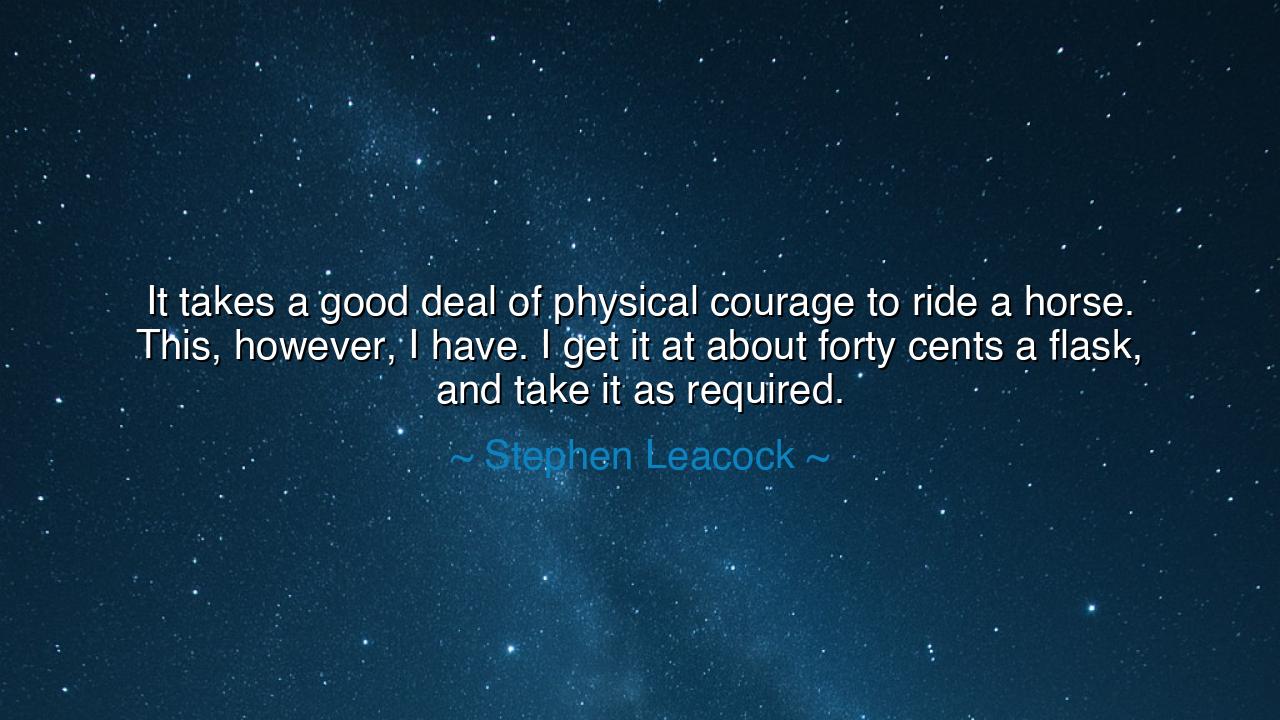
It takes a good deal of physical courage to ride a horse. This
It takes a good deal of physical courage to ride a horse. This, however, I have. I get it at about forty cents a flask, and take it as required.






The humorist and philosopher Stephen Leacock, whose wit gleamed like sunlight upon the surface of ordinary life, once remarked: “It takes a good deal of physical courage to ride a horse. This, however, I have. I get it at about forty cents a flask, and take it as required.” At first glance, these words seem playful, a mere jest at the expense of his own timidity. Yet beneath their humor lies a profound truth about the human condition—our struggle to mask fear with false courage, our tendency to seek strength not within the heart but in the fleeting warmth of external comforts. Leacock, through laughter, reveals what is most universal in us: the longing to appear brave, even when we tremble inside.
The origin of this quote lies in Leacock’s mastery of irony. As a satirist, he wielded humor not as a weapon of scorn, but as a mirror to human folly. Born in Canada at the turn of the twentieth century, he lived in a world that prized stoic masculinity, daring, and physical bravery. To confess fear—to admit one’s unease at danger—was often considered weakness. Yet Leacock, in his wisdom, chose to laugh at the very idea of false heroism. By claiming to find his courage “at forty cents a flask,” he mocks the notion that bravery can be bought, that one may replace inner strength with artificial confidence. His jest, though light, carries the quiet weight of truth: the courage that depends on illusion is not courage at all.
But do not mistake his tone for cynicism. Beneath the humor beats a heart of compassion. Leacock understood that fear is not shameful—it is human. The man who drinks before mounting a horse is not evil or cowardly; he is merely seeking refuge from the storm within. In this way, Leacock invites us not to ridicule, but to recognize ourselves in the figure he describes. Who among us has not reached for some “flask” in moments of doubt—whether it be pride, distraction, or the comforting lie that we are in control? His words remind us that true courage is not the absence of fear, but the mastery of it without disguise.
Consider the story of Ernest Shackleton, the great explorer of the Antarctic, who faced death on the icy seas with nothing but his will and his faith in his men. There was no flask to ease his terror, no shield from the biting cold or the crushing silence of the poles. Yet Shackleton pressed forward, not because he was fearless, but because he chose action in the presence of fear. His courage was not borrowed—it was born of purpose. He did not laugh at danger as Leacock did, but he embodied the deeper meaning of the humor: that true bravery does not need intoxication, only conviction.
Leacock’s brilliance lies in his ability to make the reader smile, then think. His jest about the flask is not a mockery of weakness, but a reminder of where real strength must be sought. When we depend on the flask—on any external comfort—to face life’s trials, we build our confidence upon sand. The wave of truth soon washes it away. But when we cultivate inner courage, we build upon rock, and even the fiercest storm cannot sweep us aside. The laughter his line provokes is the gentle laughter of recognition—an acknowledgment that we have all, at times, looked for courage in the wrong places.
There is also, in Leacock’s humor, a deeper lesson about humility. To laugh at one’s own fear is itself an act of bravery. The man who can confess his frailty openly, who can admit his trembling before the world, is already freer than the one who hides behind false bravado. Laughter, then, becomes its own form of courage—a way of meeting fear without surrender. In this sense, Leacock’s joke carries a hidden nobility: it is the wisdom of a man who has learned to face his humanity without shame.
So, my child, let this lesson settle in your heart: courage does not come from the flask, the crowd, or the applause of others—it arises from quiet conviction, from the knowledge that fear need not rule the soul. When you are afraid, do not flee to illusions. Face the horse. Feel the trembling, and ride anyway. For the laughter that begins in mockery may end in truth: that the only courage worth having is the kind that endures when all false comforts have failed.
Thus, in the simple jest of Stephen Leacock, there lies a timeless parable. Through humor, he shows that even the trembling hand can grasp greatness, that even the fearful heart can find its way. Laughter is the mirror of wisdom, and in his reflection we see both our folly and our potential. To be brave, then, is not to banish fear—but to meet it honestly, soberly, and still take the next step forward.






AAdministratorAdministrator
Welcome, honored guests. Please leave a comment, we will respond soon